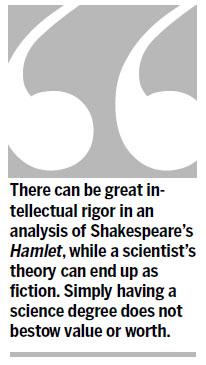Bad advice can ruin the journey
By Berlin Fang (China Daily) Updated: 2012-07-10 08:07

July is an exciting yet challenging month for high school graduates who will apply to universities after they find out how well they have done in the annual College Entrance Examination. As a change of major is not very common in China, students may feel that they are facing a one-shot deal in choosing an area of study and their future career.
The choice can weigh heavy on young students, many of whom are not yet equipped with the skills and knowledge to make such decisions. Many turn to parents, teachers and other authoritative figures for advice. Unfortunately, some of these advisers offer their words of wisdom based not on a student's interests and potential, but on what is "hot".
Recently, a Harbin Institute of Technology professor lamented on his micro blog that his friend's daughter had chosen to study history at Peking University. "A silly liberal arts girl came into being," the professor declared. When challenged about his statement, the professor went on to say that liberal arts students will eventually develop an "anti-science" mentality and often go on to harm society.
Seriously?
In this age when people are so desperate for attention they are willing to roll in manure to get their 15 minutes of fame, the professor's words simply seem irrelevant and irresponsible. However, it brought to mind a conversation I had a year ago with a Chinese engineer, and I decided not to dismiss the professor's words so lightly. The engineer said his son had to study engineering for his major because it would train his son to think "scientifically". Everything else, he argued, is useless.
I studied English as my major in China and then studied for a master's degree in science in the United States. I learned to appreciate the beauty and value of scientific thinking, and I went on to become an instructional designer working with content experts in many disciplines. Migrating from one major to another, I realized that each discipline of study carries its own rigor or standards to measure quality. There can be great intellectual rigor in an analysis of Shakespeare's Hamlet, while a scientist's theory can end up as fiction. Simply having a science degree does not bestow value or worth. There are good scientists and bad ones, just as there are good historians and bad ones. A shoddy scientist can wreak havoc. One major is not naturally superior to another.
The professor and the engineer are viewing life through the tunnel vision of their academic background.
Generally speaking, every discipline can train a discerning and creative mind. You cannot compare apples to oranges. A composer cannot send a rocket into space, but a scientist cannot write a symphony. A rocket and a symphony each have their own worth.
For a young person about to embark on a journey of learning, I think the important question is not which major is more useful, but which is the most congenial soil that will enable the student to grow. People succeed by finding their natural aptitude, and exploiting effort and opportunity.
Life is a journey of discovery. For all the words of wisdom the Harbin professor can offer, he is not going to be the one suffering if a student follows his advice and ends up choosing something that he or she spends the rest of his or her life disliking. Besides, no major is permanently "hot". Students should stop wondering which are the "hot" majors, and wonder instead which major will enable them to fulfill their potential.
The author is a US-based
instructional designer, literary
translator and columnist writing on cross-cultural issues.
(China Daily 07/10/2012 page8)











